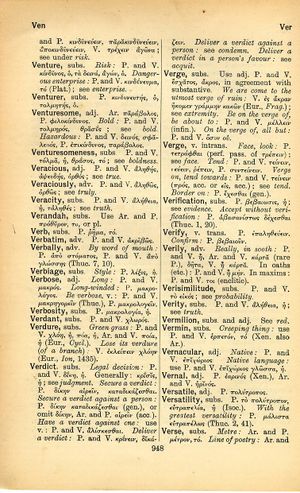verge: Difference between revisions
From LSJ
ὥσπερ ἀνέµου 'ξαίφνης ἀσελγοῦς γενοµένου → just as when a wind suddenly turns foul, just as when a wind suddenly turns nasty
(CSV5) |
m (Text replacement - "<b class="b2">Frag.</b>" to "''Frag.''") |
||
| Line 4: | Line 4: | ||
Use adj. P. and V. [[ἔσχατος]], [[ἄκρος]], in agreement with substantive. | Use adj. P. and V. [[ἔσχατος]], [[ἄκρος]], in agreement with substantive. | ||
<b class="b2">We are come to the utmost verge of ruin</b>: V. ἐς ἄκραν ἥκομεν γράμμην κακῶν (Eur., | <b class="b2">We are come to the utmost verge of ruin</b>: V. ἐς ἄκραν ἥκομεν γράμμην κακῶν (Eur., ''Frag.''); see [[extremity]]. | ||
<b class="b2">Be on the verge of be about to</b>: P. and V. μέλλειν (infin.). | <b class="b2">Be on the verge of be about to</b>: P. and V. μέλλειν (infin.). | ||
Revision as of 11:01, 7 August 2017
English > Greek (Woodhouse)
subs.
Use adj. P. and V. ἔσχατος, ἄκρος, in agreement with substantive.
We are come to the utmost verge of ruin: V. ἐς ἄκραν ἥκομεν γράμμην κακῶν (Eur., Frag.); see extremity.
Be on the verge of be about to: P. and V. μέλλειν (infin.).
On the verge of, all but: P. and V. ὅσον οὐ.
v. intrans.
Face, look: P. τετράφθαι (perf. pass. of τρέπειν); see face.
Tend: P. and V. τείνειν, νεύειν, ῥέπειν, P. συντείνειν.
Verge on, tend towards: P. and V. τείνειν (πρός, acc. or εἰς, acc.); see tend.
Border on: P. ἔχεσθαι (gen.).

